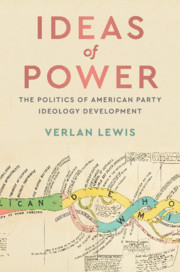Book contents
- Ideas of Power
- Ideas of Power
- Copyright page
- Dedication
- Contents
- Figures
- Tables
- Preface
- Acknowledgments
- 1 The Liberal Conservative Myth and Political Science
- 2 A Political Theory of American Party Ideology Development
- 3 The Presidency and Party Theories of Foreign Intervention
- 4 Unified Government and Party Theories of Economic Intervention
- 5 The Supreme Court and Party Theories of Judicial Intervention
- 6 Politics, History, and American Party Ideology Development
- Book part
- Bibliography
- Index
1 - The Liberal Conservative Myth and Political Science
Published online by Cambridge University Press: 15 April 2019
- Ideas of Power
- Ideas of Power
- Copyright page
- Dedication
- Contents
- Figures
- Tables
- Preface
- Acknowledgments
- 1 The Liberal Conservative Myth and Political Science
- 2 A Political Theory of American Party Ideology Development
- 3 The Presidency and Party Theories of Foreign Intervention
- 4 Unified Government and Party Theories of Economic Intervention
- 5 The Supreme Court and Party Theories of Judicial Intervention
- 6 Politics, History, and American Party Ideology Development
- Book part
- Bibliography
- Index
Summary
- Type
- Chapter
- Information
- Ideas of PowerThe Politics of American Party Ideology Development, pp. 1 - 24Publisher: Cambridge University PressPrint publication year: 2019



